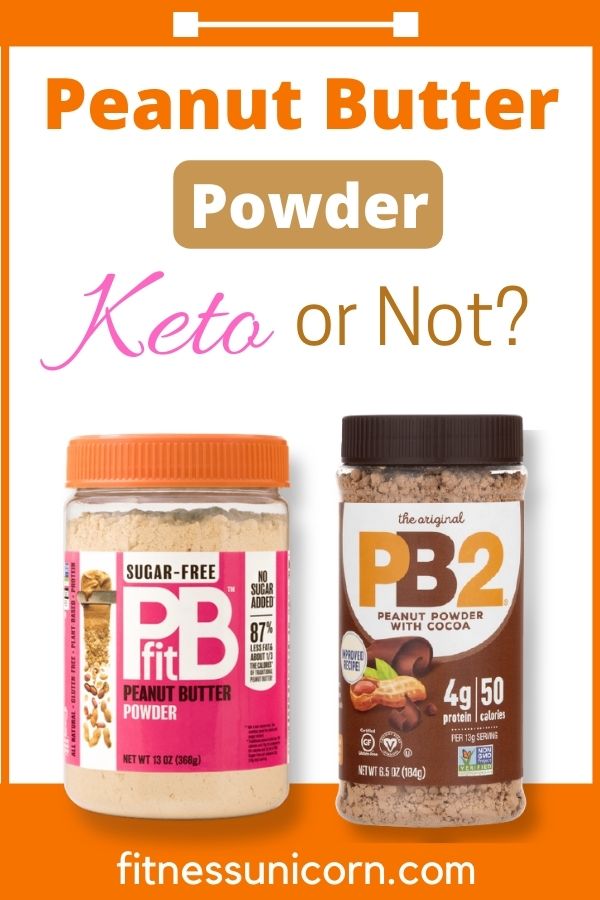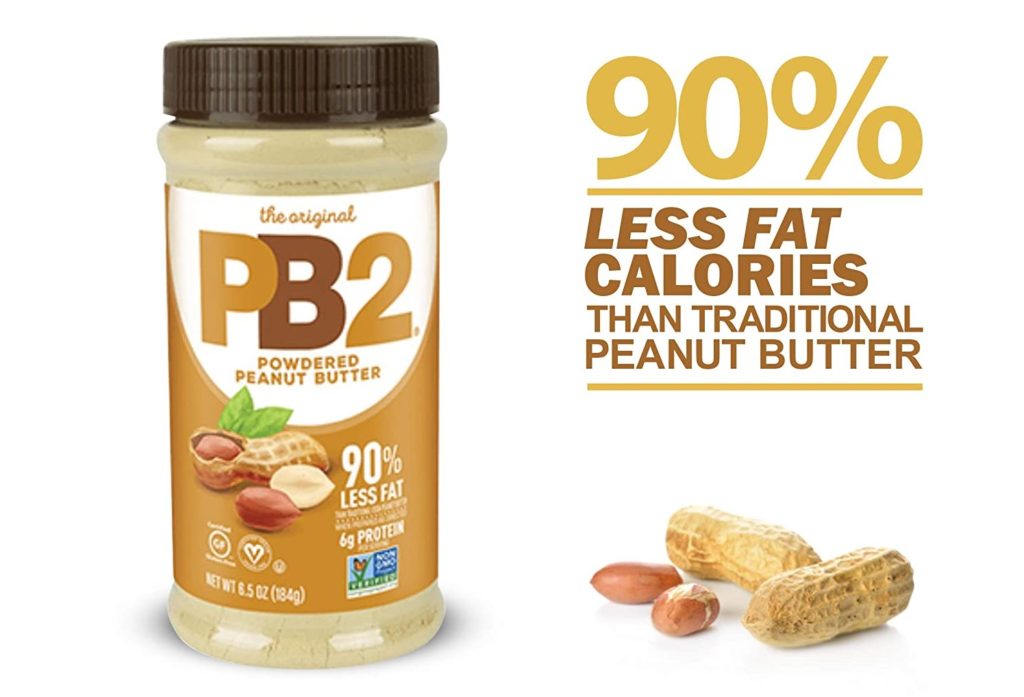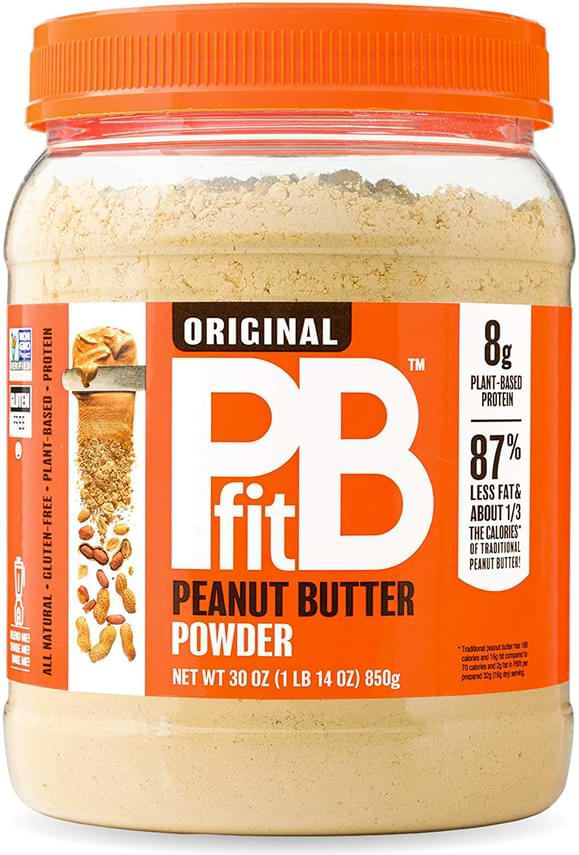Peanut butter powders are a new rage among fitness enthusiasts!
They are made by removing fatty oils from roasted peanuts and then grinding them into a smooth powder. Luckily, the end product has much fewer calories than the regular peanut butter!
It’s a win-win situation for those trying to cut down calories.
But what if you are on a low-carb diet? How does the two compare in terms of carbs?
In this article, we’ll find out whether PBfit and PB2 are keto-friendly and how you can include them in your diet.

What Makes Powdered PB So Special?
Powdered peanut butter contains 80% fewer calories than its original counterpart. Removing those excess oils from peanuts also takes away the calories.
Here’s what the stats say: A single tablespoon of natural peanut butter contains over 100 calories whereas powdered ones (like PB2) have only 22 calories per tablespoon.
This comes as a boon for people on a tight calorie budget!

A person trying to lose weight aims to eat less than the “maintenance” calories. That’s when the innovations like these come in so handy! You get all the goodness of peanut butter without those extra cals!
What’s more, peanut butter powder is quite useful in various recipes where you simply can’t use the regular butter.
Since it has fewer fats, it’s much easier to mix with other syrups and liquids! Or you can use it as a seasoning to sprinkle over your favorite baked goods (yummy!)
In fact, you could even add some water and turn it into a paste. But don’t expect the same smoothness like peanut butter, duh!
So far we have seen how PB2 or PBfit can help save you fat and calories. But what if your whole diet revolves around fatty foods?
What if you don’t give a damn about calories but only care about the carbs?
Let’s find out!
Is PB2 Powder Keto?
PB2 is high in carbs and isn’t very keto-friendly. Each serving of 2 tablespoon contains 4-5g of net carbs.
In fact, PB2 is only worse than regular peanut butter since it is devoid of fats. The good-quality unsaturated fats are pressed out when making PB2 powder.
On top of it, the powder also contains added sugar.
So you are essentially getting the same (or more) number of carbs with much fewer fats than the peanut butter!

What’s more, you are not only losing the good fats, but also saying goodbye to the fat-soluble vitamins.
Peanut butter is a well-known source of Vitamin E, a fat-soluble vitamin. A single serving contains as much as 15% of your daily recommended intake.
But the moment you shift to powdered PB, you miss out on this powerful anti-oxidant! This is actually a big deal considering the fact that 80% of Americans fail to meet their daily recommended intake of Vitamin E.
If you really want to use PB2 powder for whatever reason, we highly recommend diluting those carbs!
However, there are ways to dilute the carbs in PB2 and turn it into a much more keto-friendly paste. You can easily mix it with unsweetened almond milk or HWC and use stevia to sweeten it.
Here are the nutrition stats for PB2:
Serving Size: 2 tbsp.
- Calories: 60
- Protein: 6g
- Fats: 1.5g
- Carbs: 5g
- Fiber: 1g
- Net Carbs: 4g
PB2 powder (diluted) is a great match for keto-friendly smoothies. When mixed with hwc, it’s a great addition to low-carb frozen desserts!
RELATED: Are Boiled Peanuts keto?
Is PBfit Peanut Butter Powder Keto Friendly?
PBfit is a natural peanut butter powder with significantly reduced fat and calories. It is quite similar to PB2 in terms of taste and nutrition.
PBfit peanut butter powder is moderately keto. While it does have a low carb count (2g net carbs per serving) those carbs come from added sugar, which isn’t acceptable.
I was so amazed to find out that they have a sugar-free version with monk fruit. But after diving deeper into their nutrition label, I realized that it has only 1g of monk fruit and 2g of sugar!

It can really be a game-changer for fat-fearing, calorie-stressing peeps! But for us keto-ers who want to maximize fat intake, PBfit just doesn’t cut it.
Either way, you can have it “if it fits your macros” for the day. I have always been an advocate of the IIFYM approach!
An average keto diet limits your daily intake to less than 25g of net carbs. So even if you decide to have a serving of peanut butter, make sure to compensate for it with high-fat meals throughout the day.
Here is the carb guide for all variants of PBfit powder:
| Variant | Net Carbs per 2 tbsp. |
|---|---|
| PBfit Peanut Butter Powder (original) | 2g |
| PBfit Pure Peanut | 3g |
| +Protein (with Plant Protein) | 8g |
| Organic PBfit | 2g |
| PBfit Chocolate | 4g |
| PBfit Plus (with Whey Protein) | 5g |
| Sugar-Free PBfit Powder | 3g |
Out of all the variants, sugar-free PBfit is the most keto-friendly.
While they have the same number of carbs, the sugar-free version has less added sugar. (Too much sugar can throw you out of ketosis even if you are eating within the carb limits!)
PBfit powdered peanut butter is made by pushing out all the excess oil from peanuts. Once they dry out, all the peanuts are grounded to a thin powder that is packaged and sold!
Having said that, I always keep a jar of PBfit in my pantry!
I love sprinkling PBfit over some HWC (heavy whipping cream) and serving it with strawberries! It’s a perfect keto-friendly dessert to satisfy my sweet tooth!
They also make an excellent addition to protein shakes like the Premier Protein or Fairlife.
Conclusion
Peanut butter powders have fewer fats and calories than the original peanut butter. However, they both are quite similar in terms of carbs.
Since keto is a high-fat, low-carb diet, you are better off with regular peanut butter.
If you really want to have PBfit or PB2 for some reason, always remember to adjust your macros for the day!
